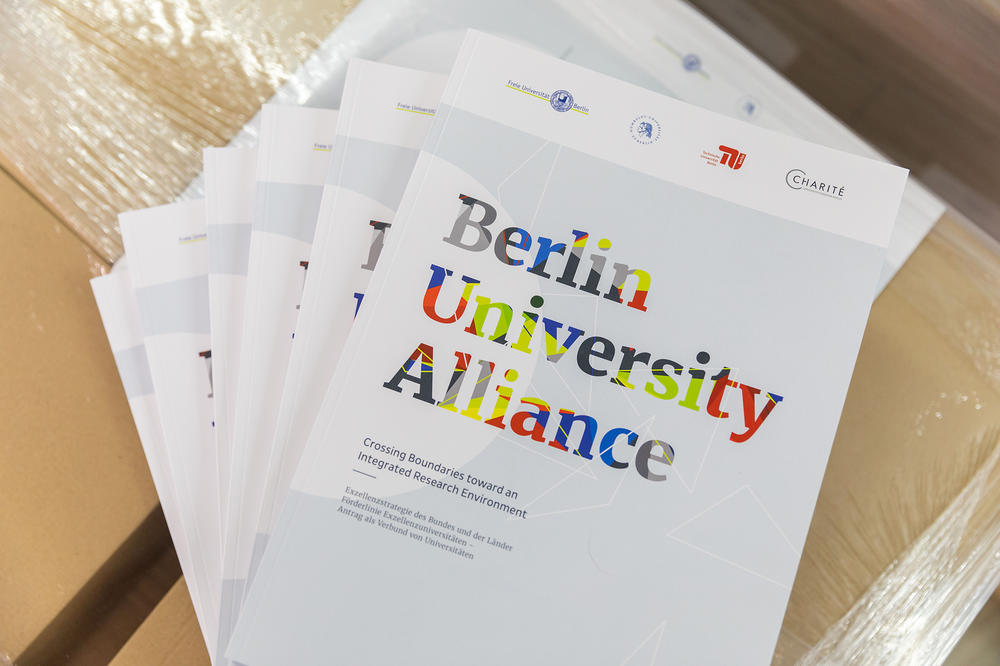Working Together
The three major universities in Berlin, Freie Universität Berlin, Humboldt-Universität zu Berlin, and Technische Universität Berlin, along with Charité – Universitätsmedizin Berlin, joined forces in 2018 to form the Berlin University Alliance. With a cooperation agreement, the four partners confirmed that they wanted to intensify and institutionally consolidate their successful cooperation in the areas of third-party funding acquisition, the implementation of specialized degree programs, and issues relating to university policy.
Their joint proposal “Crossing Boundaries toward an Integrated Research Environment” in the Excellence Strategy of the German federal and state governments was approved in 2019, and the Berlin University Alliance has been funded since November of that year as the only university consortium of excellence. The funding will initially run until 2026 and amount to 144.5 million euros.
.
Four institutions – one proposal in the Excellence Strategy of the German federal and state governments.
Image Credit: Felix Noak
Berlin as an Integrated Research Environment
With their proposal, the four partners set themselves the goals of shaping Berlin as an integrated research environment and of promoting the development of Berlin as one of the leading research locations in Europe. In order to achieve these goals, five fields of action (“Objectives”) were defined as well as three overarching topics (“Cross-cutting themes”). The cross-cutting themes are of strategic importance for all the Objectives. You can find an overview here.
Collaboration Platform
In order to simplify the cooperation between the alliance partners, a collaboration platform was set up as a corporation under public law (“Körperschaft des öffentlichen Rechts”). As the central administrative unit of the Berlin University Alliance, the collaboration platform supports the partners in implementing the goals of the alliance and facilitates the cooperation between the partners and other actors, regionally and internationally. This institutionalized form of cooperation was already provided for in the proposal, and the necessary law was passed in the Berlin House of Representatives in October 2020.
Committees and Structure of the Berlin University Alliance
The Berlin University Alliance is headed by the Board of Directors, which consists of the heads of the four partner institutions. For Freie Universität this is the president of the university, Prof. Dr. Günter M. Ziegler.
The Executive Board is responsible for the administrative implementation of the strategic decisions made by the Board of Directors and the overall coherence of the measures. It is made up of one management member from each of the network partners: Prof. Dr. Verena Blechinger-Talcott, Executive Vice President of Freie Universität Berlin, represents Freie Universität on this board.
The Administrative Office of the Berlin University Alliance was set up to implement the goals set forth in the proposal. It is responsible for the overall project management of the alliance. It coordinates the implementation of the planned projects with regard to the goals of the alliance and, in particular, supports the boards and committees.
The task of the Quality Management Unit (QMU) is to systematically establish, oversee, and further develop the quality management system (QMS) or quality management (QM) for the BUA and its projects.
Each objective and cross-cutting theme is managed by a Management Unit. A Steering Committee is responsible for the further development of the content and concept of the respective field of activity. You can find an overview of the representatives from Freie Universität Berlin in the Steering Committees here.
Two committees support the development of the Berlin University Alliance in an advisory capacity: the Internal Scientific Council and the International Advisory Board.
At Freie Universität Berlin the entire project is supported by the FU-BUA unit as part of Division VI: Research.

